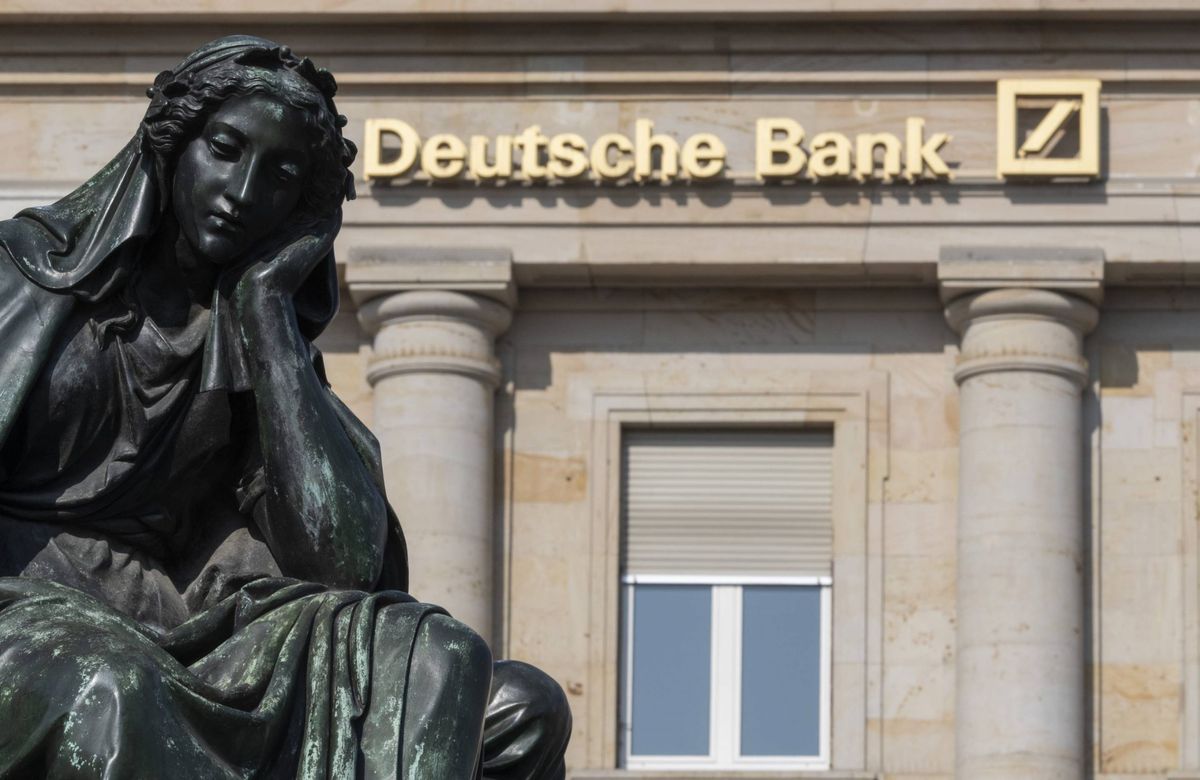Deutsche Bank’s relationship with Jeffrey Epstein highlights its associations with the powerful

A few minutes every morning is all you need.
Stay up to date on the world's Headlines and Human Stories. It's fun, it's factual, it's fluff-free.
On Tuesday, July 7, the state of New York imposed a US$150 million fee on Deutsche Bank, based in Frankfurt, Germany, for dealings it had with the now-deceased convicted sex offender Jeffrey Epstein. Epstein, whose August 2019 suicide while in federal custody has been widely cast into doubt, had faced multiple charges of sex trafficking minors.
Deutsche Bank, a multinational investment bank, has business dealings all over the world. Its connections to powerful political figures – including President Donald Trump and former Secretary of State Hillary Clinton – has resulted in the bank’s business dealings frequently making headlines.
Deutsche Bank’s ties to Jeffrey Epstein
In a Tuesday press release, the New York State Department of Financial Services (DFS) revealed it had levied a US$150 million fee against “Deutsche Bank AG, its New York branch, and Deutsche Bank Trust Company America.” The fee was initially announced by Superintendent of Financial Services Linda A. Lacewell.
The fee was “for significant compliance failures in connection with the Bank’s relationship with Jeffrey Epstein and correspondent banking relationships with Danske Bank Estonia (“Danske Estonia”) and FBME Bank (“FBME”).”
Deutsche Bank’s dealings with Epstein involved “millions of dollars in suspicious transactions” according to New York Governor Andrew Cuomo. The DFS found Epstein’s well-publicized criminal activities (including sex with minors) should have resulted in greater scrutiny of the transactions from the bank.
The transactions are believed to include payments to alleged co-conspirators, millions in legal settlement payments and payments to Russian and Eastern European models, with those involving “payments for women’s school tuition, hotel and rent expenses.” There were also US$800,000 in “periodic suspicious cash withdrawals” over a four-year period.
Deutsche Bank has agreed to pay the fine and says it is investing nearly US$1 billion “to improve its training and controls.”
What did Jeffrey Epstein do?
Epstein’s dealings with the bank occurred after the wealthy financier had pleaded guilty to two sex crimes in 2008, one of which involved a minor. Epstein served 13 months in prison and registered as a sex offender as part of a plea deal that allowed him to avoid a trial for multiple counts of sexual acts with a minor.
Epstein’s sexual crimes continued even after his 2008 conviction, with numerous women accusing him and his associates of rape and sexual predation.
As a financier, Epstein operated Financial Trust Co. and had both business and personal dealings with numerous high-profile names, including Presidents Trump and Bill Clinton. Epstein’s total wealth is unknown, though he was at times referred to as a billionaire. He owned homes in New York, Florida and New Mexico, as well as in Paris, France and the Virgin Islands.
Epstein owned a private Boeing 272 plane, nicknamed the “Lolita Express,” on which he flew underage women across the country and raped them.
On Thursday, July 2, Epstein’s former girlfriend and confidant, Ghislaine Maxwell, was arrested by the FBI as an alleged conspirator in Epstein’s crimes.
Donald Trump’s Deutsche Bank loans
While Trump has sought to distance himself from his associations with Epstein, his business dealings with Deutsche Bank have also been a focus of considerable attention.
In June, Mother Jones reported that Trump’s half a billion dollars in loans owed to the bank “may be his biggest conflict of interest yet.” The Trump Organization’s debts to the bank, which involve payments on valuable assets like Trump Tower in Manhattan, are “maturing at a perilous moment” when Trump’s businesses are seeing a decline in revenue.
With Trump in the White House and many of the debts under his own name, the report argues the debts could “take his conflicts of interest to absurd new heights.” The report further alleges that Trump’s political decisions could be guided by his personal financial interests.
Trump has borrowed money from Deutsche Bank since the 1990s, a time when American banks had stopped lending to him due to his multiple bankruptcies. Now, Trump is said to have multiple loans with the German bank due for repayment in the next few years, including US$125 million due in 2023 and US$170 million due in 2024.
If Trump wins reelection, he will be in office until January 2025.
Despite Trump’s long history with Deutsche Bank, bank executives reportedly refused to give him a loan during his 2016 presidential run.
Supreme Court decides on Trump’s financial records
Trump’s dealings with the bank have also been at the center of two subpoenas, one from a New York grand jury and the other from the House Financial Services Committee. Both have been seeking Trump’s financial records, which are held by Deutsche Bank among other financial institutions.
Trump has been attempting to block access to his records based on the argument that, as president, he is “categorically immune.” On Thursday, July 9, the Supreme Court rejected that argument, allowing the New York grand jury access to Trump’s tax records.
The Supreme Court did not allow Congress access, however, citing “significant separation of powers concerns.” Both rulings were sent back to lower courts for review.
Hillary Clinton’s Deutsche Bank speech
Trump’s rival in the 2016 election, Hillary Clinton, might not have direct financial dealings with Deutsche Bank, but a speech she made to the bank’s executives in 2014 ended up harming her credibility.
Clinton was frequently accused of being “too cozy” with Wall Street banks, especially after the financial collapse of 2008. She faced criticism from the left-wing of the Democratic Party and supporters of Vermont Senator Bernie Sanders, who ran in the Democratic primary against her.
A series of speeches Clinton gave to various bank executives in 2014 became a regular line of attack. Clinton’s critics demanded she release the text of the speeches, but her campaign refused. Ultimately, the speeches were released by WikiLeaks.
In addition to speeches to Goldman Sachs and other Wall Street banks, Clinton gave one speech to Deutsche Bank executives in October 2014. In it, she lamented that people see “the game is rigged against them.” She said a solution would “come from the industry itself.”
Some of Clinton’s aides felt the speech demonstrated that she understood the concern of working Americans. Critics, however, felt Clinton’s insistence that the banks police themselves showed she didn’t understand the crisis and wouldn’t do enough to ensure another one didn’t occur.
Fining the banks
While this latest move against Deutsche Bank is the first time regulators have fined a bank for ties to Jeffrey Epstein, large banks have previously paid substantial fees for malfeasance. For instance, following the 2008 financial crisis, governments around the world levied fees for the big banks’ role in the collapse.
In the United States alone, banks paid US$243 billion in fees in the decade following the crisis. That included US$76 billion from Bank of America and US$44 billion from JPMorgan Chase. Across the entire globe, banks paid US$321 billion in fines in roughly the same period.However, despite these fees and the crisis, banks still managed to bring in US$1 trillion in profits by 2017. In 2019, the US banking industry made a collective US$233.1 billion in profits.
Have a tip or story? Get in touch with our reporters at tips@themilsource.com




Comments ()